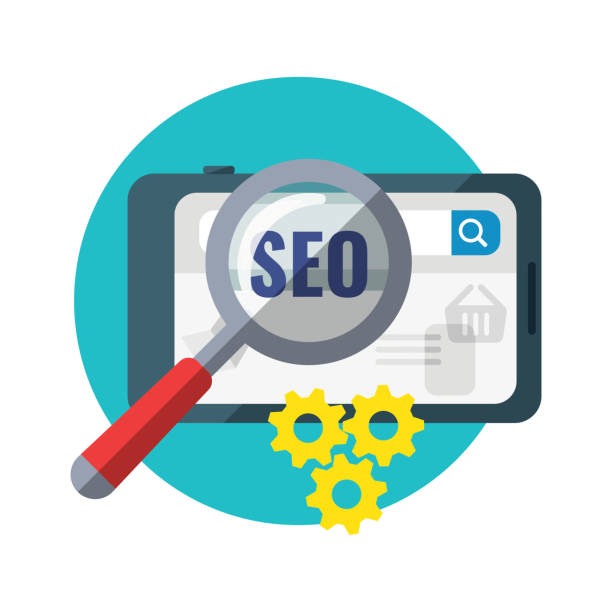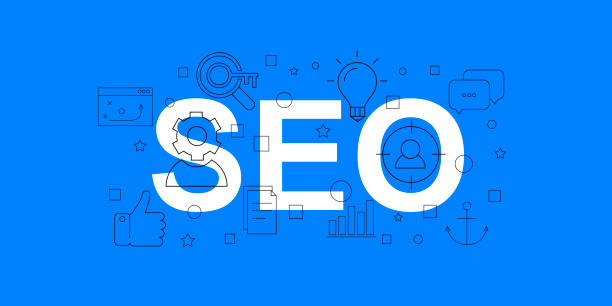Introduction to SEO and its Importance in the Digital World
In the current era, where the internet has become an indispensable part of daily life, being seen amidst a flood of information and competitors is crucial for any business.
This is where SEO, or Search Engine Optimization, plays its pivotal role.
SEO refers to a set of techniques and strategies used to improve a website’s ranking in the natural (unpaid) results of search engines like Google, Bing, and Yahoo.
Imagine your website appearing on the first page of Google for keywords related to your business; this means a significant increase in visitors, potential customers, and ultimately, revenue.
This process not only helps with #more_traffic but also enhances your brand’s #credibility and #trustworthiness.
SEO is a long-term investment that brings sustainable results and, unlike paid advertising, does not require payment per click.
A deep understanding of how search engine algorithms work and adapting your website to them is the first step towards success in this field.
This article will be a comprehensive educational and explanatory guide for you to become familiar with various aspects of SEO.
Is your e-commerce site ready to attract maximum customers and increase sales? RasaWeb transforms your online business with modern and efficient e-commerce website designs.
✅ Increased speed and improved SEO
✅ Excellent user experience on mobile and desktop⚡ Get a free e-commerce website design consultation from RasaWeb!
Types of SEO: On-Page and Off-Page
To achieve a successful Search Engine Optimization (SEO) strategy, it is essential to understand and simultaneously apply its two main dimensions: On-Page SEO and Off-Page SEO.
On-Page SEO refers to all actions taken within your website and under your direct control to improve its ranking in search results.
These actions include optimizing content, proper use of keywords in titles, meta descriptions, and body text, image optimization, URL structure, page loading speed, and user experience (UX).
The goal of On-Page SEO is to help search engines best understand the topic and quality of your pages’ content.
In contrast, Off-Page SEO refers to activities outside your website that influence your domain’s authority and power in the eyes of search engines.
The main part of Off-Page SEO is link building (Backlink Building), meaning receiving links from other websites to your site.
These links act like votes of confidence, and the higher their number and quality, the more authoritative your site becomes to search engines.
Activities such as social media marketing, participating in forums and blogs, and publishing content on other platforms can also indirectly affect your Off-Page SEO.
A specialized SEO strategy is an artistic blend of these two approaches that complement each other and help increase your site’s power and ranking in search results.
Understanding the distinction between these two types of SEO forms the basis of any subsequent optimization efforts.
Keyword Research: The Beating Heart of SEO
Keyword research can be considered the backbone of any successful SEO strategy.
Without understanding exactly what your target audience is searching for, all your optimization efforts will be like shooting in the dark.
The goal of keyword research is to identify the phrases and terms that users employ in search engines to find products, services, or information related to your business.
This process involves discovering keywords with high search volume and reasonable competitiveness, identifying long-tail keywords that bring more targeted traffic, and understanding user intent behind various search queries.
Various tools such as Google Keyword Planner, Ahrefs, Semrush, and KWFinder help you in this regard to find new keyword ideas, measure their search volume, and analyze the level of competition.
Using these tools will be a practical and specialized guide for compiling the final keyword list.
Choosing the right keywords means placing the right content in front of the right audience, which leads to an increase in conversion rates and ultimately the success of your business.
This stage is not only educational but also requires deep analysis and understanding of your target market.
A strong keyword list is the cornerstone for producing valuable content and subsequent site optimizations.
| Tool Name | Primary Use | Data Type | Free/Paid |
|---|---|---|---|
| Google Keyword Planner | Finding new keywords, estimating search volume | Search Volume, Competition | Free (requires Google Ads account) |
| Ahrefs | Keyword analysis, competitor analysis, link building | Search Volume, KD, SERP, Links | Paid |
| Semrush | Keyword analysis, technical SEO, content analysis | Search Volume, CPC, SERP | Paid |
| KWFinder | Finding low-competition keywords | Search Volume, KD, Suggestions | Free (limited), Paid |
| Google Search Console | Keywords that the site ranks for | Impressions, Clicks, CTR | Free |
Content Optimization for Search Engines
After keyword research, the next crucial step in the SEO process is content creation and optimization.
Content is the heart of your website and the primary factor in attracting users and search engines.
Content optimization means creating content that is both valuable and engaging for users, and helps search engine algorithms to understand its topic and quality well.
This includes the natural and purposeful use of keywords in the title tag, meta description, headings (H1, H2, H3), and throughout the text.
However, keywords alone are not enough; content must be comprehensive, accurate, and unique.
Question-provoking content that addresses all aspects of a topic can meet user needs and keep them on your page for a longer time, which is a positive signal for search engines.
Using high-quality images and videos, charts, and infographics also contributes to visual appeal and increases user engagement with the content.
Furthermore, content readability is very important; using short sentences, small paragraphs, lists, and highlighting key points helps users easily find the information they need.
Content optimization is a practical explanatory guide that directly impacts your site’s ranking.
Producing principled and high-quality content is not only vital for SEO but also enhances your credibility as an authoritative information source.
Did you know that 85% of customers check your company’s website before any interaction?
With RasaWeb, build a corporate website that befits your reputation.
✅ Increase customer credibility and trust
✅ Attract high-quality leads
⚡ Get a free website design consultation!
Technical SEO: Ensuring a Strong Website Infrastructure
Technical SEO might be less visible than content creation, but it plays a vital role in a website’s success in search results.
This part of SEO focuses on optimizing your website’s technical infrastructure so that search engines can easily crawl and index it.
Without a strong technical foundation, even the best content might not be seen.
Elements such as site loading speed, which is one of Google’s most important ranking factors and a key determinant of user experience, are part of technical SEO.
Slow websites disappoint users and search engines.
Responsiveness (Responsive Design) and mobile compatibility are also highly important, as a significant portion of searches today are conducted via mobile devices.
URL structure, Robots.txt file, XML Sitemap, using an SSL certificate for security (HTTPS), and preventing duplicate content through Canonical tags are all technical SEO measures.
Reviewing and fixing 404 errors, ensuring the health of internal and external links, and implementing structured data (Schema Markup) also help search engines better understand your content and display it more richly in search results.
This part of SEO requires specialized knowledge and should be periodically reviewed and improved to ensure your website is always in the best technical condition.
A site with a strong technical infrastructure not only helps search engines but also provides a better user experience for visitors.
Click here to preview your posts with PRO themes ››
Link Building and Increasing Domain Authority
Link Building is one of the most powerful and challenging aspects of Off-Page SEO that directly impacts your website’s authority and domain power.
Links, especially those given from reputable and relevant websites to your site (backlinks), act as votes of confidence or recommendations from others.
The more high-quality and reputable websites link to you, the more authoritative and referential search engines will consider your site, giving it a higher ranking.
There are various link-building strategies that can be utilized, including producing shareable and high-quality content that naturally attracts links (organic link building), guest posting on reputable blogs, collaborating with influencers, and using relevant industry directories.
It is important to emphasize the quality of links, not just the quantity.
Low-quality or spammy links not only do not help with SEO but may also lead to penalties from search engines.
Therefore, conducting a precise analysis of your backlink profile and competitors is crucial.
This process is a continuous guide for finding new link-building opportunities as well as disavowing harmful links.
Keep in mind that link building is a time-consuming and continuous process, and its results show themselves in the long term, but its impact on improving your site’s ranking and authority is undeniable and helps you stay ahead in the competitive online space.
Reviewing and Analyzing SEO Data with Tools
One of the most important steps in any SEO strategy is continuous monitoring and analysis of website performance.
Without this stage, you cannot measure the effectiveness of your efforts, identify strengths and weaknesses, and make informed decisions for future optimizations.
Analytical SEO tools play a vital role in this process.
Google Search Console and Google Analytics are two free and powerful Google tools that every SEO specialist must master.
Search Console provides precise information about how Google indexes your pages, the keywords you rank for, crawl errors, and organic traffic.
Google Analytics also provides detailed insights into user behavior on your website, such as time on site, bounce rate, user paths, and traffic sources.
By combining data from these two tools, you can gain a comprehensive picture of your website’s SEO status.
Paid tools like Ahrefs and Semrush also offer more advanced analytical capabilities for examining backlinks, competitor analysis, and keyword ranking tracking.
Data analysis helps you identify engaging content and understand which parts of the website need improvement.
This process is not only a guide for technical improvements but also gives you insight to optimize your content strategies.
Continuous and specialized monitoring of data is key to maintaining and improving your website’s position in search results.
Click here to preview your posts with PRO themes ››
| Metric | Description | Monitoring Tools |
|---|---|---|
| Organic Traffic | Number of visitors from natural search results | Google Analytics, Google Search Console |
| Keyword Ranking | Page position for specific keywords | Google Search Console, Ahrefs, Semrush |
| Bounce Rate | Percentage of visitors who view only one page and leave the site | Google Analytics |
| Time on Site | Average time users spend on the site | Google Analytics |
| Backlinks | Number and quality of links received from other sites | Google Search Console, Ahrefs, Semrush |
| Crawl Errors | Problems Google has in indexing your pages | Google Search Console |
Local SEO and Its Importance for Physical Businesses
Local SEO is a vital subset of SEO that holds special importance for businesses with a physical presence or those providing services in a specific area.
The goal of local SEO is to increase your business’s visibility in local search results, so that customers near you can easily find you.
When a user searches for a phrase like “restaurant near me” or “best car repair in Tehran”, search engines prioritize local results.
The foundation of local SEO is optimizing your Google My Business (GMB) profile.
Accurately completing GMB information, including business name, address, phone number, working hours, business category, high-quality images, and responding to customer reviews, is crucial for local ranking.
Furthermore, ensuring NAP (Name, Address, Phone Number) consistency across all online directories and your website plays a key role.
Receiving positive reviews from customers and actively responding to them in GMB increases your business’s credibility and sends a positive signal to search engines.
Producing locally-focused content such as blog posts about local events or regional news, and using geographical keywords in your site’s content, also helps improve local SEO.
This is a specialized approach that enables small and medium-sized businesses to compete with larger rivals and attract their local customers.
By correctly implementing local SEO strategies, you can significantly increase your in-person customer base and lead in your local market.
Does your company website perform as well as your brand deserves? In today’s competitive world, your website is your most important online tool. RasaWeb, specializing in professional corporate website design, helps you to:
✅ Gain customer credibility and trust
✅ Convert website visitors into customers
⚡ Get a free consultation!
The Future of SEO and New Trends
The world of SEO is constantly evolving, and search engine algorithms are continuously updated to provide users with the best and most relevant results.
Understanding future SEO trends and preparing for them is vital for maintaining and improving your website’s position.
One of the most important recent trends is Artificial Intelligence (AI) and Machine Learning, which are increasingly integrated into Google’s algorithms (such as RankBrain and MUM).
This means that search engines have gained an even greater ability to understand the complexities of natural language and user intent.
Therefore, producing engaging, comprehensive, and authoritative content that provides in-depth answers to users’ questions has become doubly important.
Voice Search is also growing rapidly, and optimizing for it with more natural language and long-tail keywords is becoming essential.
Additionally, optimizing for video and YouTube, given the increasing popularity of video content, is a growing area in SEO.
Core Web Vitals, which relate to user experience metrics (such as loading speed and interactivity), have become an important ranking factor.
The concept of question-provoking content will gain more importance in the future of SEO, as AI is capable of answering more complex questions.
Staying informed about the latest Google developments and updates, and adapting SEO strategies accordingly, is crucial for success in this dynamic space.
The future of SEO is built on a deeper understanding of users, providing the best user experience, and producing very high-quality and authoritative content.
Common SEO Mistakes and How to Avoid Them
In the path of Search Engine Optimization (SEO), making common mistakes can render your efforts fruitless and even lead to your website being penalized by search engines.
Understanding and avoiding these mistakes is a crucial part of any specialized guide to SEO.
One of the biggest mistakes is keyword stuffing; the excessive and unnatural use of keywords in the text with the aim of deceiving search engines, which is not only ineffective but can also harm your ranking.
Another is low-quality or duplicate content.
Search engines reward original, comprehensive, and valuable content.
Copying content or producing superficial content not only doesn’t help users but also damages your site’s credibility.
Ignoring technical SEO aspects such as slow site speed, lack of mobile compatibility, and the presence of crawl errors can also prevent your pages from being correctly indexed.
Furthermore, spammy link building or purchasing low-quality links is a red flag for Google and can lead to severe penalties.
Not continuously updating content and SEO strategies is also a common mistake; the world of SEO is dynamic, and what works today might be obsolete tomorrow.
Finally, lack of data analysis and monitoring of SEO performance prevents you from understanding the effectiveness of your efforts and identifying areas for improvement.
By understanding these mistakes and adopting an explanatory and preventive approach, you can avoid common SEO pitfalls and pave your way to sustainable success in search results.
Continuous monitoring and learning from experiences are key to success in SEO.
Click here to preview your posts with PRO themes ››
Frequently Asked Questions
| Question | Answer |
|---|---|
| What is SEO? | SEO, or Search Engine Optimization, is the process of increasing the quality and quantity of website traffic by improving the site’s ranking in natural (organic) search results, such as Google. |
| What are the main types of SEO? | SEO is divided into three main categories: On-Page SEO, Off-Page SEO, and Technical SEO. |
| What does On-Page SEO include? | On-Page SEO includes optimizing elements within the website, such as keywords, title tags, meta descriptions, content, URL structure, images, and internal links. |
| What is Off-Page SEO? | Off-Page SEO refers to activities outside the website that help improve its ranking, such as backlink building, social media marketing, and brand mentions. |
| What is Technical SEO? | Technical SEO involves optimizing the technical aspects of a website to help search engines crawl and index it better. This includes site speed, mobile-friendliness, site structure, sitemaps, and the Robots.txt file. |
| What role do Keywords play in SEO? | Keywords are the phrases that users enter into search engines. Proper and targeted use of relevant keywords in content and site elements helps search engines understand your page’s topic and display it for relevant searches. |
| What is a Backlink and why is it important? | A backlink, or inbound link, is a link from one website to another. Backlinks act as a “vote of confidence” from other sites for search engines and play a significant role in a site’s authority and ranking improvement, especially if they are from reputable sites. |
| How does quality content affect SEO? | Quality, relevant, comprehensive, and unique content not only attracts and retains users but also shows search engines that your page is valuable. This helps improve ranking, reduce bounce rate, and increase user time on site. |
| Why is site loading speed important for SEO? | Site loading speed is an important ranking factor for Google. Faster sites provide a better user experience, have lower bounce rates, and are preferred by search engines. |
| Is SEO a one-time process? | No, SEO is a continuous and long-term process. Search engine algorithms are constantly changing, competition is increasing, and site content also needs updating. Therefore, SEO requires continuous monitoring, analysis, and optimization. |
And other services of Rasa Web advertising agency in the field of advertising
Smart Marketing Automation: A dedicated service for growing user engagement based on precise audience targeting.
Smart Conversion Rate Optimization: Designed for businesses seeking to attract customers through user experience customization.
Smart Digital Advertising: Designed for businesses looking for online growth through attractive user interface design.
Smart Marketing Automation: A fast and efficient solution for improving SEO ranking with a focus on marketing automation.
Smart Marketplace: An innovative platform for improving campaign management with intelligent data analysis.
And over hundreds of other services in the field of internet advertising, advertising consultation, and organizational solutions
Internet Advertising | Advertising Strategy | Advertorial
Resources
Faradars SEO TrainingMizbanfa Comprehensive SEO GuideRajamarketing Iranian Websites SEOHostiran What is SEO and How Does It Work?
? Are you ready for your business to shine in the digital space? RasaWeb Afarin, by providing comprehensive digital marketing services including corporate website design, SEO, and social media management, paves your path to success.
📍 Tehran, Mirdamad Street, next to Bank Markazi, Kazerun Jonubi Alley, Ramin Alley, No. 6













